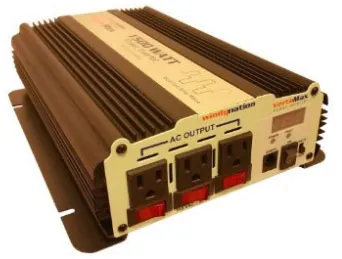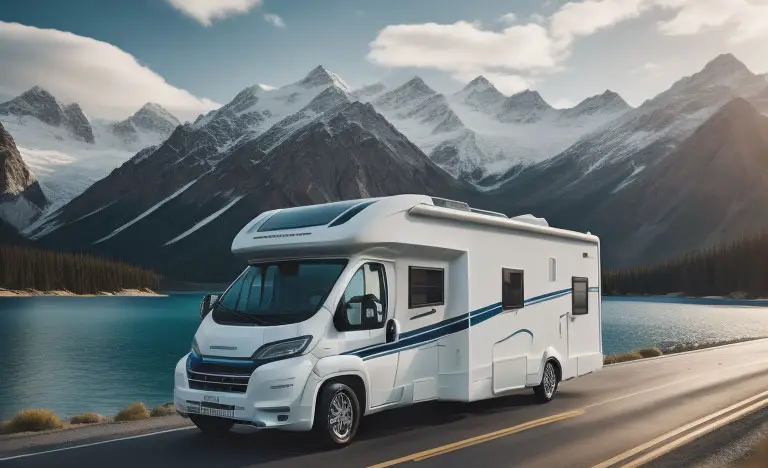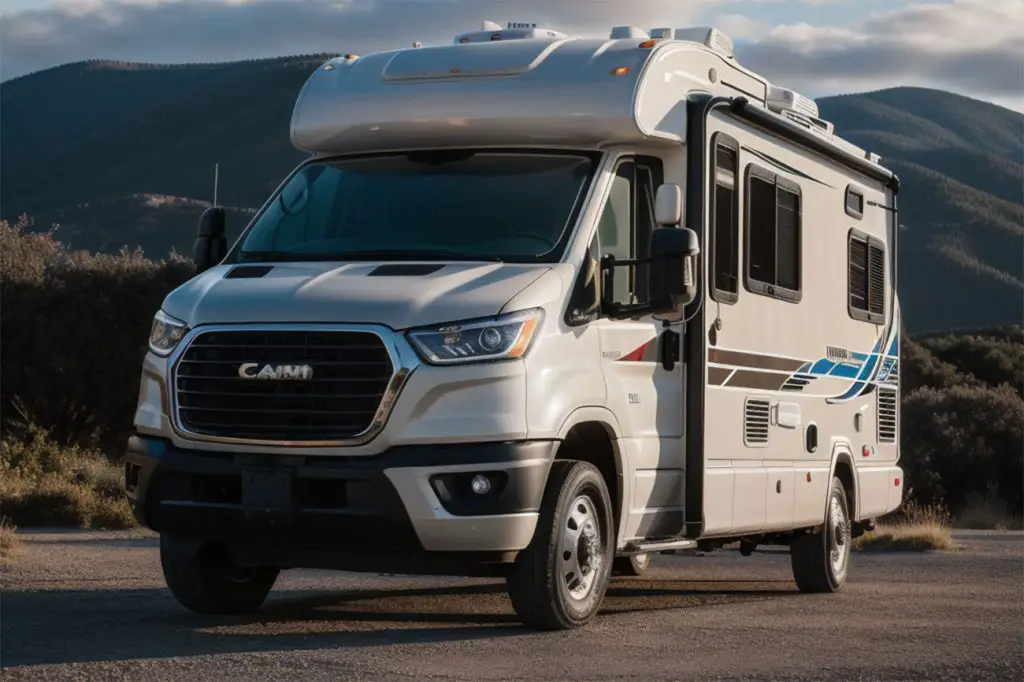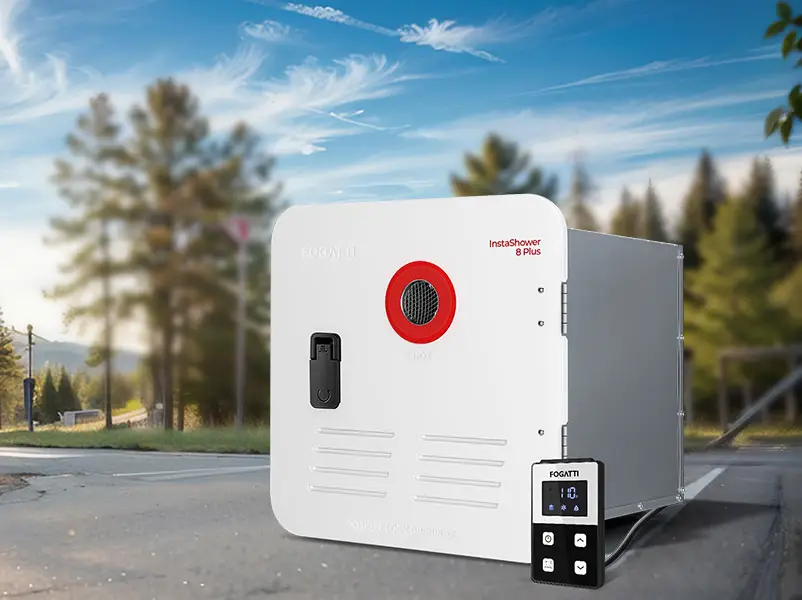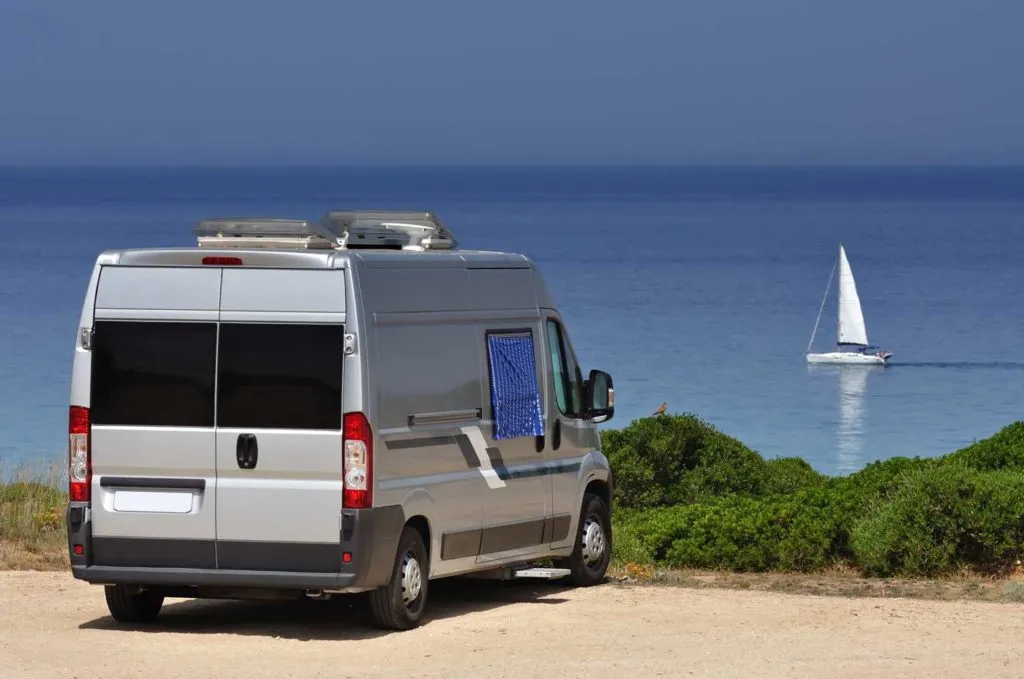Last Updated on March 6, 2024
Key Takeaways:
- 3-Way Fridge: Opt for an RV with a 3-way fridge for flexible power options, crucial for full-timing, as it can run on battery, shore power, and propane.
- Full-Size Refrigerator: Prioritize an RV with a full-size refrigerator for ample storage and convenience, especially during extended trips.
- Seating Area: Look for an RV with a seating area that remains accessible even when the bed is set up, providing comfort and practicality for daily living.
- Solar Power: Invest in solar panels to supplement battery power, crucial for extended dry camping trips and reducing reliance on generators.
- Inverter: Choose an RV with an inverter for converting battery power to 110V, enabling the use of regular electric devices even when off-grid.
- Door Screens: Ensure the RV has door screens to enhance ventilation, keep bugs out, and maintain overall comfort during camping.
- Kitchen Sink and Counter Space: Prioritize an RV with a decent-sized kitchen sink and ample counter space for food preparation and storage.
- No Cassette Toilet: Avoid RVs with cassette toilets, opting instead for models with traditional black tanks for easier maintenance and convenience.
- Adequate Storage Space: Look for ample storage space to keep belongings organized and accessible, crucial for everyday living in the RV.
- LED Lights: Enhance energy efficiency with LED lights, reducing battery drain and improving the quality of living quarters.
- Multiple Charging Options: Ensure multiple ways of charging electronics, including outlets, solar generators, and alternators, for added convenience.
- Decorative Touches: Add decorative elements to personalize the RV and make it feel more like home, but avoid overdoing it to prevent damage while driving.
- Contingency Plan: Have a contingency plan for emergencies, including spare parts and solutions for common RV problems.
- Laundry Solutions: Consider portable washing machines or laundry alternatives for managing laundry needs while on the road.
- Multiple Heating Options: Have various heating options like propane furnaces, space heaters, and heated blankets for comfort in different weather conditions.
- Willingness to Adapt: Stay open to adapting to RV living, trying new things, and finding what works best for your lifestyle.
- Relax and Have Fun: Enjoy the RV lifestyle and embrace the freedom it offers, focusing on making the most out of every experience.
When I’ve decided to buy my RV, I knew nothing about them. I didn’t know what features were important and what were not.
After living in my Class B RV for a year, I’ve learned a lot about RVs and their components. With that being said, if you’re like me, you definitely want to know what things you should look for in a Class B RV if you want to go full-time.
Here are the things that I would advise you to look for when you purchase your next RV.
1) 3-Way-Fridge
In order to live comfortably, the type of fridge that you invest in can make a major difference. So, for full-timing, I recommend buying an RV with a 3-way-fridge or having one installed. Some of the newer Class Bs don’t have propane tanks anymore but if you do, you want a 3-way-fridge.
I learned this the hard way. My class B RV had a 12V/Electric (2-way) fridge. Even though I had a solar panel on top, and I was charging my battery when I was driving, it was always a constant battle to keep the fridge running and not dying. Class B RVs have limited battery power and when you are not hooked into electricity it will use your battery power.
3-way fridges are beneficial for numerous reasons because it allows you to use different resources for power. Since your situation can change depending on where you are, the power needed can come from your home battery, shore power, and propane gas.
This is not the case with a 2-way fridge since the power sources will be only limited to 2 sources. Either battery and shore power or propane and shore power. When dry camping, your fridge will deplete your battery, even if you have solar panels. Especially on overcast days or days in the shade. Propane setting uses so little and it allows you to use your fridge in the long run when you are dry-camping.
2) Full-Size Refrigerator instead of a small fridge on the floor
Most small RVs don’t have enough space for a larger fridge, but for full-timing, you might want a larger fridge. Just try to find an RV with a full-size refrigerator. This is because the full-size refrigerator will allow you to store more food items when you are out on a long trip and dry camping. My plan was really to go for at least 1 week without having to move and buy groceries.
Full-sized refrigerators are also much more convenient for taking in and out food. You don’t have to bend down each time you need to use the refrigerator, unlike when it is a small one placed on the floor.
3) Seating Area
My RV had a nice seating area with two benches and a table. However, when I converted to bed, I had no seating area left. Even though you could sit on the bed, that was tiring after a while.
Many small Class B RVs have a swivel front seat which you can use even when your bed is set up. When you are looking to full-time, get an RV where you can still sit down even when your bed is made. You need a place to spend your day or do some work.
It might not matter now, but when you’re living in your RV, you’ll realize that seating is an important feature.
4) Solar Power
The space for solar panels and batteries is limited. As soon as I bought my Class B RV I have installed a solar panel on top of it. My RV had space for only one battery, and I was constantly having problems with not having enough power to run the fridge or the propane furnace or even to charge my devices. You charge your battery when driving it or when you are plugged into electricity. The problem is when you are dry-camping for a few days. Modern RVs come with an inverter charger that will charge up the battery quickly by running the engine. You may have a generator which you can use but it is too loud and you don’t want to use it all the time. This is where some solar power will come in handy. Solar will charge your batteries quietly even when you are parking.
[amazon bestseller=”rv solar panels” items=”3″]
5) Inverter
If you are going to use your RV as a home, you will also need a lot of flexibility in your energy resources, which is where an inverter comes in. An inverter will help you to convert your 12V battery power to 110V. This works excellent with your solar panels. In addition, it is much safer to use an inverter that has a transfer relay. This will protect the battery from overloading.
Your solar panels charge your battery, and the inverter will convert the power to 110V. An inverter provides enough resources that will allow you to use your regular electric devices like your Roku, juicer, blender, and electric toothbrush, charge your laptop or mobile phone even when you are dry camping. Just note, small inverters are great to charge your devices, but when you need more power to heat water or air, for a coffee maker or toaster, they won’t work. Those types of devices will require lots of power and a small inverter won’t be able to handle them. In this case, you will need a generator, hopefully, which you have on board.
6) Door Screens
Even though my RV traditionally had screens on the windows, it didn’t have on the back doors and the side door. Most people will find, however, this is not a luxury but a necessity since these screens will help with keeping out bugs and mosquitoes.
Door screens help with the ventilation of the RV, and they are able to be opened even during windy days. These will help with overall comfort. The door screens also allow airflow from the front windows into the back doors, which can prevent condensation from forming on your windows or walls.
7) Kitchen Sink and Counter Space
Having a small kitchen sink is basic in most Class B RVs but having counter space is not. The more counter space you have, the better since you can use it for food preparation or storing stuff.
8) No Cassette Toilet
One important feature that I like to look for in an RV is a decent bathroom/toilet. This might not matter much if you’re only going to be living in your RV part-time, but it will become inevitable when you are living full-time. Some people don’t like the wet baths, I don’t mind it, but the cassette toilet annoyed me. I would rather have a black tank and empty it when I empty my other tank. Cassette toilets are so small and have to be emptied separately.
9) Adequate Storage Space
In addition to enough counter space, you need to have storage space. You’ll sooner realize that storage space is important to keep your things organized. When you travel, everything moves and you need to pack up your stuff. You need to make sure you have plenty of storage space for your belongings, clothes, jackets, pots, pans, food storage containers, cleaning supplies, etc.
Tips for Using Your Class B RV for Everyday Living
When using your RV as a home, it’s important to keep these few things in mind:
1) Buy LED Lights for Inside Your RV
One must-have accessory that is inexpensive yet has a huge effect on the quality of your living quarters is the use of LED lights. Because LED lights draw less power, they can significantly reduce the drain on your battery.
2) Have Multiple Ways of Charging Electronics
Another important accessory to have is more than one way of charging your electronics. You’ll want to be able to plug into an outlet, use on-board 12V chargers, solar generators, and you can use your alternator when you’re on the road.
3) Add Some Decorative Touches
Although most people think of RVs as temporary housing, adding some decorative touches will make it feel more like home. Whether it is an indoor or outdoor rug for warmth or a tablecloth to cover up the cheap particle board, these little touches will add a level of comfort to your home. When adding decorative pieces, though, don’t go overboard. Remember, things will move around. Some may fall every once in a while. It is wise not to leave anything of value lying around in places where they can fall from when you are driving.
4) Prepare for the Inevitable
When you buy an RV, it might be a good idea to make sure that you have a contingency plan for when things inevitably go wrong. While some problems are minor and simple to fix, others might require a part or a replacement. Either way, it’s good to have a plan for these types of emergencies.
5) Make Sure You Have Enough Storage Space
As mentioned earlier, it is important to be smart about your home’s organization and storage space. You should look into purchasing different cabinets or other options that can help you store and keep things organized and off the floor. For example, you can find some storage bins that go perfectly under the bed.
7) Laundry
Most RVs don’t have washers and dryers. This is a given since space and water is limited. There are laundromats are in many places but if you want to live in your RV full time, you may want to consider getting some kinds of ways to do some laundry when you need it. There are tiny portable, foldable washing machines, or wash plungers you can use.
[amazon table=”11051″]
6) Have More than One Way to Heat Your Vehicle
Depending on where you travel and the time of year, temperatures will vary quite a lot. Many class B RVs have a propane furnace. However, for times when you are plugged into electricity, it is better to use small space heaters. It doesn’t hurt to have some hot water bottles or even 12V heated blankets, either.
7) Be Willing to Adapt
Whether it is learning how to cook with limited space, or where to spend your days when it’s raining outside, be willing to adapt and try different things if something isn’t working for you. RV living is very unique, and so is each person. Make sure to be willing to try new things if you want to get the most out of your full-time RV life.
8) Relax and Have Fun!
Above all, enjoy yourself! Don’t worry too much about little mistakes or problems that come up, and just focus on making the best of any situation. If you aren’t enjoying yourself, then the whole experience will be nothing but stressful.



